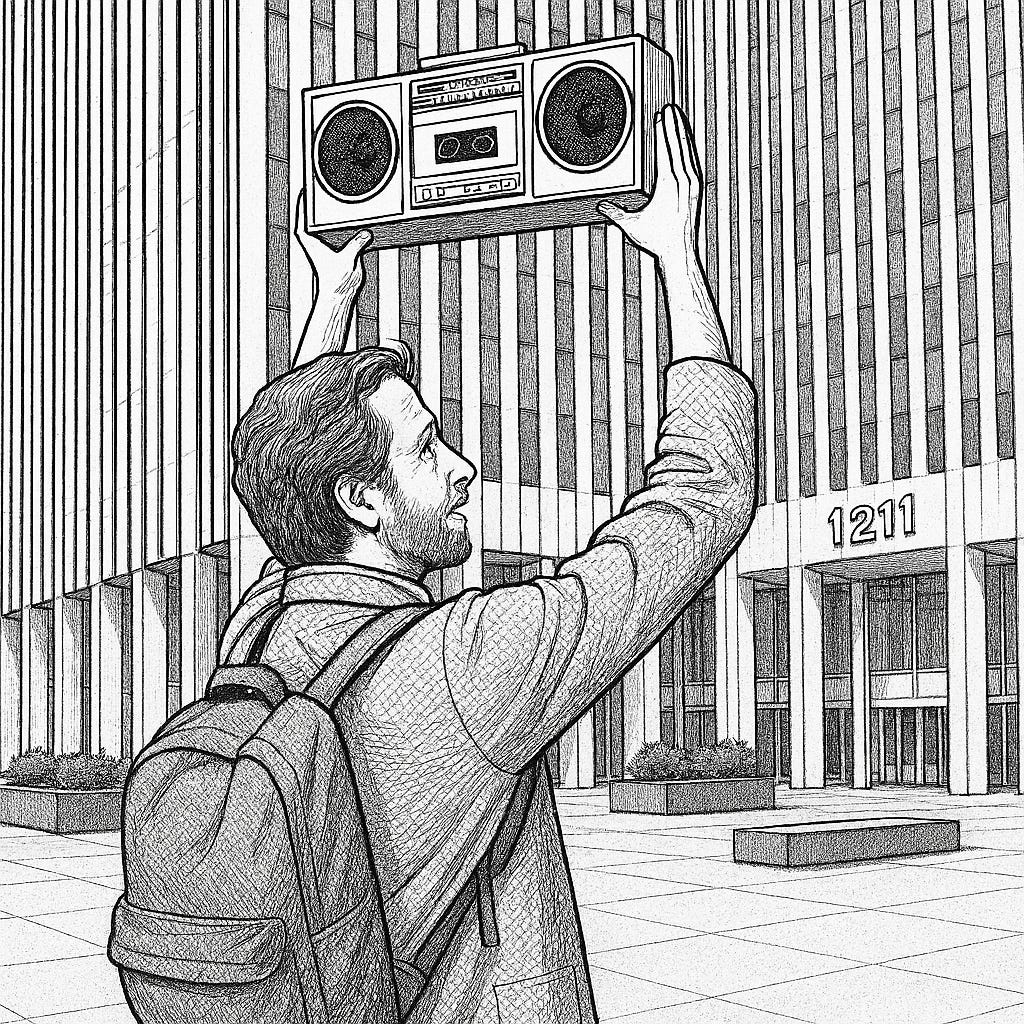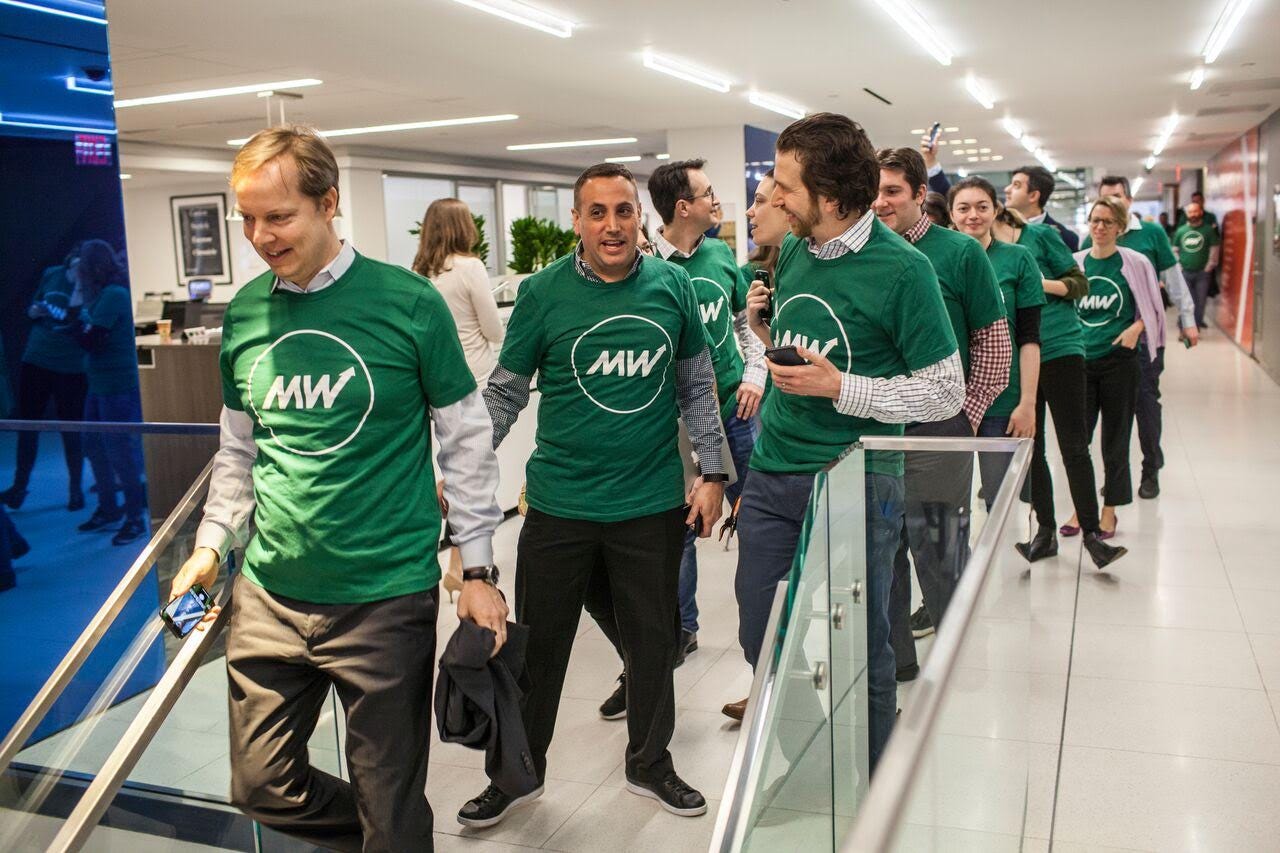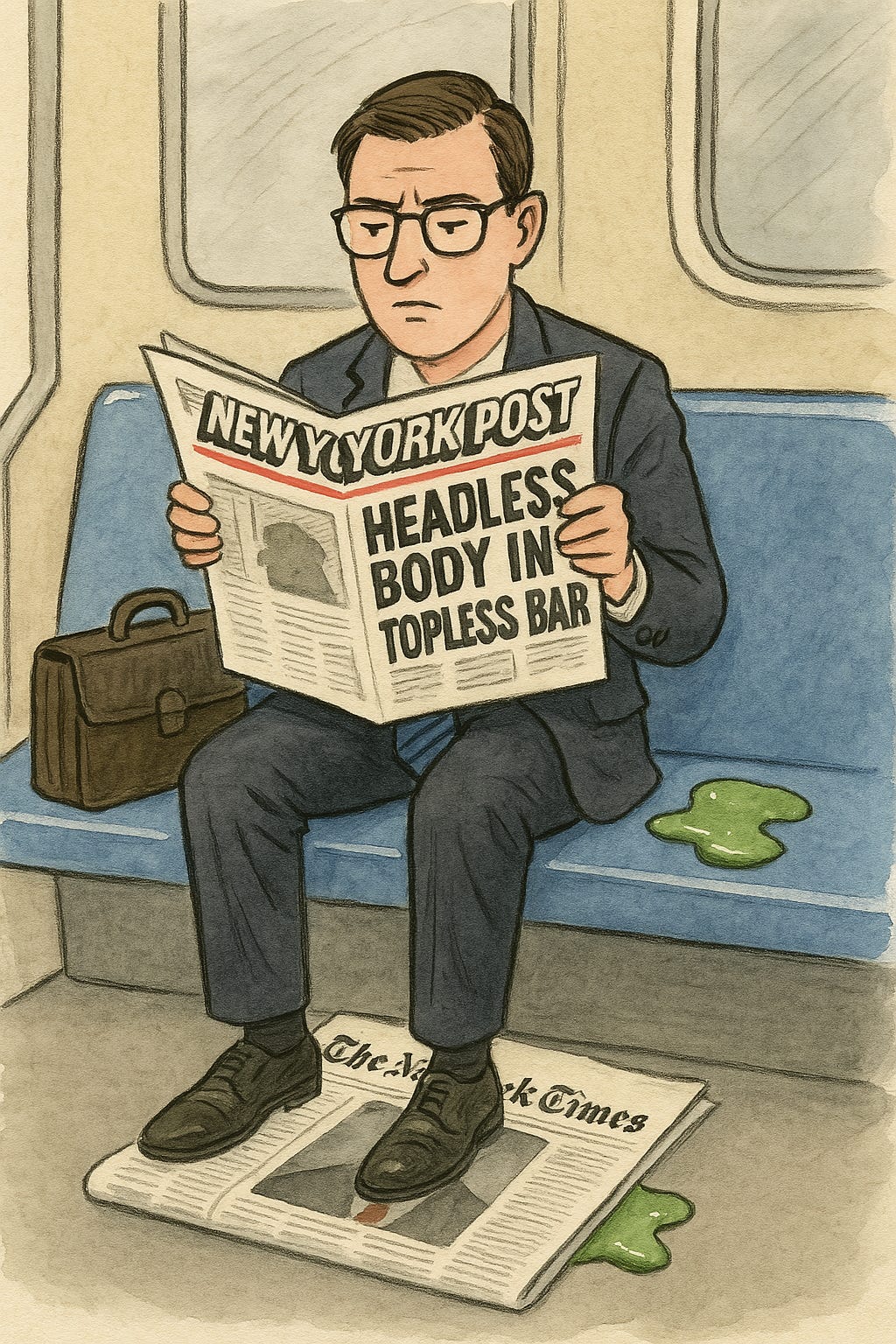My Passionate, 21-Year Affair With a Midtown Office Building
A love letter to newsrooms and a farewell to WSJ, MarketWatch and the New York Post

Dear 1211 Avenue of the Americas,
This is going to be a love letter.
Middle-aged midtown office buildings probably don’t get many, I’m guessing, as it violates the conventions of the genre for the recipient to also be the address.
Then again, I once wrote a front-page obituary for a dead tree in Queens, a similarly weird melding of subject and object. That story, oddly enough, is what brought me into your embrace.
So what if you’re short for midtown… Short on sunlight, with those stingy pinstripes of glass… Short of the spotlight that turns heads and flips cameras over in Times Square and Rockefeller Center…
You are my mother ship, 1211. My professional home of 21 years. My most constant address. In your 45 stories, I have written, edited and lived thousands… worked for four publications and held nine job titles – all without ever leaving the corporation you headquarter. Until now…
This is going to be a love letter. Under the circumstances it is also going to be a goodbye.
7th floor, recently
Our workplace romance ended the usual way… in a conference room with H.R.
A restructuring… It’s not you, it’s us… I knew this script well, having delivered it a few times myself from the opposite side of the tissue box. I also knew, as H.R. tells us in The Godfather Part II, “this is the business we’ve chosen.”
It still stung.
Surely, not me. It must be a glitch – or AI hallucination…
Maybe I can talk my way out of it, the way Falstaff pleaded his case to H.R.H. in Henry IV?
“Banish Peto, banish Bardolph, banish Poins, but… banish not me thy Harry’s Rupert’s company…”
That didn't end well for Falstaff, come to think of it.
Enter Socrates, raising a steaming cup of greenish brew from the Flavia machine.
“Remember what I told Crito?” he asked.
Yes, Socrates. He offered to bust you out of prison to save your life, and in order to explain why you need to face your sentence, you staged an imaginary dialogue with the Laws of Athens.
“You were brought into the world and nurtured and educated by us,” the Laws say, with serious Jewish mother guilt-trip vibes. Now you are going to abandon us, just because the system you have praised in a miscarriage of justice and mere 55% of the popular vote has condemned you?
That always seemed absurd to me.
But maybe you’re right, Socrates. 1211 nurtured me, trained, raised, promoted, and celebrated me... made my life and family possible… made me a better writer, editor, leader and human.
I’m not angry. This was always a month to month lease, 1211. Your address always seemed to be counting down to something….
But I am getting ahead of myself. A buildingsroman has to start at the beginning.
10th floor, 2003
You are the most Gen X thing ever, 1211. When you opened in 1973, the city and its architectural imagination were at such a low they dubbed you and your siblings, 1221 and 1251, the XYZ buildings. You were Z, 1211 – the final piece and latchkey kid of Rockefeller Center.
I came into the picture about a year later and 32 blocks south.
When I was a kid, my dad worked next door at 1185. (And Athena says sons rarely surpass their fathers.)
Though I’m sure I walked by many times, I didn’t spin through those revolving doors until my late 20s, when I had an interview for a reporting job at The New York Post.
Gersh Kuntzman, a Post columnist I met years earlier covering the Parks Commissioner’s surreal funeral for the Weeping Beech tree, recommended me for the job.
I felt like Clark Kent walking into 1211. And am lucky City Editor Jesse Angelo had the foresight to overlook the fact that I looked like Clark Kent’s bar mitzvah photo, given that after losing 35 pounds I was swimming in my suit. I also had braces. After hearing my ideas for covering Queens, he asked why I wanted to work at the New York Post.
So I told him a story. A few months earlier, as I got on a crowded downtown No. 2. Train, I spotted a lone and suspiciously empty seat.
I backed off when I saw it was empty for a reason: a large dollop of orange slime. A finance guy in a nice suit then placed his bag in front of the seat and pulled out two newspapers: The Times. And the Post. He did a quick cost-benefit analysis and sat on the Times.
I got the job – about eight months later.
10th floor, 2004-2011
My first day at 1211, Jesse sent me down to the Second Avenue Deli, where sandwich prices had been rolled back to the original 15 cents in honor of the joint’s 50th anniversary. After a few interviews, I came up with the angle that diners were stiffing the waitstaff with 1954-era tips.
When I filed my copy, John Lehmann yelled across the newsroom and told me to stop pussy-footing around the story. “They’re cheapskates,” he said. “So call them cheapskates.” This was a revelation.
Every day was a carnival and a classroom. There were no meetings or Slack – the newsroom was both.
Sitting across from Dan Mangan, I got a master class in how to work sources on the phone and how to quarterback big stories on rewrite – as well as the benefits of investing in a 401(k) and reading Bruce Chatwin.
On coffee runs with Maggie Haberman, I learned what it takes to be insanely great – as she juggled conversations on three Blackberries while talking to me.
I broke stories and occasionally got to add to city lore sitting at 1211: like the tip I got that a construction worker tried to curse the new Yankee Stadium by dumping Red Sox gear into the wet concrete. I interviewed Donald Trump about poetry… coined the name Octomom…
I also shared my own story: Proposing to my now wife as we crossed the finish line of the 2004 NYC Marathon together. And later, on the adventures in infertility required to conceive our children. The twins’ birth announcement ran on Page Six.
6th floor, 2011-2013
But you contain multitudes, 1211.
Four floors below the Post, Dow Jones was another world. A little less id, a little more superego. Slightly less yelling. More calendar invites.
I joined SmartMoney, knowing little about personal finance other than how to wreck my own. The audition story that won me the job: How the city’s billionaire mayor was a bit of a cheapskate when it came to footwear.
Jonathan Dahl showed me how much a manager can fight for his people and how to navigate the low level Game of Thrones always running in the background. Kevin Delaney became a model – after years of newsroom histrionics – that one could be a cerebral, visionary leader while retaining the calm and empathy of a Mr. Rogers.
I also edited and managed reporters for the first time, lucky to get to learn from and champion Quentin Fottrell, AnnaMaria Andriotis, Jonnelle Marte, and Steven Kutz, among others.
SmartMoney got shut down and many of us were merged into MarketWatch, where I eventually became the personal finance editor.
6th and 4th floors, 2013-2022
Almar Latour changed my life. He also saved me from death.
I had been offered an amazing opportunity writing and rethinking The Wall Street Journal’s obituaries. Kirsten Danis asked me to do some sample obits, so I filed one on a personal finance legend, and another on our current president. I was ready to take on the dead beat, but…
“We’re putting that job offer on hold,” Almar told me a week later. “Something else has come up.”
That something was the editor in chief job at MarketWatch. I thought he was nuts. A day later I returned to his office without much of a poker face.
“Now you want it,” he smiled. Almar saw things in me I never saw in myself, and had a knack for motivating people to exceed expectations.
MarketWatch was a digital pioneer with a fast metabolism and a hard-working crew. Tim Rostan, always kept the homepage, copy, and newsroom arguments from going off the rails and was an instant ally. There are too many others to name, though I did once try.
I came to see our homepage as a weather report for your money – do you need an umbrella or a lifeboat?
Though 1211 was HQ, I learned to coordinate teams around the world. The culture and vibe of the office needed to extend beyond 47th Street.

Almar gave me 21 goals for the first year alone – and we hit most of them.
Another unofficial goal was to make our corner of 1211 a jerk-free zone, and we mostly succeeded. MarketWatch quadrupled its audience and the team quadrupled my faith in and love for the enterprise.
I banned photos of the stock-exchange floor, decorated your walls 1211, launched new verticals, print editions, hosted a podcast, wrote manifestos, and helped Quentin launch The Moneyist, which became our hit column.
Most rewarding was getting to hire great editors and reporters, starting with Mark DeCambre, my eventual successor.
5th and 6th floors, 2022-recently
I was ready to move to a new story at 1211 when Nikki Waller asked me if I could suggest anyone to build out personal finance coverage at WSJ.
The Journal should own personal finance, I said. It should be treated as a core beat and not a side dish – the one topic of interest to 100% of current and potential readers. Nikki is a great editor, thinker and friend. By the end of the conversation she convinced me to raise my hand.
Some told me this move was a step down from managing a newsroom. I never saw it that way. This was a problem to fix at 1211 and an chance to rethink service journalism on a big stage.
I planned new beats: the new pursuit of happiness; death and taxes; money and love. Found an office spouse in Geoff Rogow – and with Anne Tergesen and Veronica Dagher launched a passion project of mine: The Way We Retire Now.
My first day at WSJ felt like getting called up to the Yankees. I worried everyone would be as brilliant as Aaron Judge or Jason Zweig. There are many superstars, but the strength of the place is its rigor and culture and collegiality — not any one individual.
That, I guess, is the point of this absurdly long love letter, 1211.
Those hours each week added up to years of my life. So many birthdays, weddings, babies, promotions, departures, audience milestones, global financial crises, awards. So much mediocre coffee, then pretty good coffee. The short-lived chandeliers, fancy snacks, performance review and fitness tracking platforms, and ever-changing elevator naming scheme.
Workplaces are not like a family, as Joe Pinsker on my team once wrote. So what is an newsroom or office building really? David Simon says it’s, “a semi-intellectual environment where everyone once seemed to be arguing about everything all the time.”
A.G. Sertillanges compared the life of the mind to a newsroom… “a great editorial or mercantile office, where each one finds in those about him the initiation, help, verification, information, encouragement, that he needs.”
I like that. 1211 and all the characters I was privileged to share the address with are stowed in my head like carry-on baggage.
Almar had a surefire strategy for working through difficult questions: leave the building and go for a walk. Or as Rilke put it: “step out of your room, where you know everything…”
I am excited for the journey to new addresses.
Please give Selwyn a fist-bump for me.
With love,
Jeremy
P.S. Brahms wrote his A major Intermezzo Op. 118 no. 2. in 1893 toward the end of his life. It was a love letter of sorts to Clara Schumann. Fittingly, I got to play it in front of 1211 last summer while I was still learning the piece. Also fittingly, there are many, many wrong notes…






Jeremy: What a bittersweet column to read. I also share so many fond memories of 1211AoA during my years with MarketWatch, WSJ Radio, and WSJ Podcasts. Enjoy Substacking. Godspeed and onward!
buildingsroman!